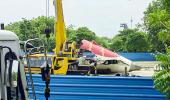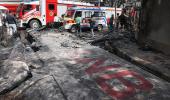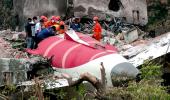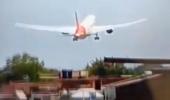'This (crash) is one of those times where there is no concrete explanation yet for what happened. I think that adds to my parents' worry.'

While investigations are on to ascertain what caused the London-bound Air India flight AI 171 to crash soon after takeoff on June 12, the aviation disaster continues to weigh on the minds of pilots, cabin crew, and their families.
Several of whom Business Standard spoke to said they and their family members felt an undeniable sense of anxiety.
The crash had left 241 of the 242 people on board dead, including both the pilots and all cabin crew. It also killed 19 people on the ground.
"This (crash) is one of those times where there is no concrete explanation yet for what happened. I think that adds to my parents' worry," said a pilot with a full-service airline, requesting not to be named.
"I try to assure them that airlines and aircraft, by nature and engineering, are meant to be safe. That logic, however, does not work well in such times."
Speaking on the condition of anonymity, another pilot, who is with a low-cost carrier, said that despite all the worry and grief, none of the airline staff talks about it, especially with their employers, for the fear of being grounded or being kept off-roster.
"Most of my colleagues meditate, box, or hit the gym every day, without fail. That is the way they cope with all the stress," the pilot said.
"Secondly, it is not feasible for us to go to a mental health professional at a fixed time because of the busy schedules we keep."
In February 2023, the Directorate General of Civil Aviation (DGCA) had asked all airlines to set up 'proactive and non-punitive' peer support programmes (PSPs) to assist the mental well-being of their pilots, cabin crew members and air traffic controllers.
Months later, in October that year, Air India Chief Executive Officer and Managing Director Campbell Wilson said in a message to employees that the airline had launched a PSP for pilots 'offering the support of professionals and mental health specialists to anyone needing assistance under the protection of complete confidentiality'.
His message added that the airline had also launched Buddy.AI, 'giving pilots the opportunity to connect with trained volunteers sharing similar professional backgrounds and an understanding of the challenges they face'.
Though several pilots and cabin crew members acknowledged a sense of anxiety during flying duty, they emphasised that years of training helps them manage such situations better due to professional preparedness.
"Pilots are trained to handle in-flight emergencies, from technical glitches to medical situations onboard," a senior pilot said.
"Some days, episodes of severe turbulence can be unsettling for passengers, but it is the rigour of our training, the depth of flying experience, and the support of crew and passengers that help us navigate such challenges," the pilot added.
Meanwhile, the issue of fatigue management and pilot rest is again in focus. Last year, DGCA had revamped the flight duty time limitation (FDTL) norms.
The new FDTL norms call for additional rest for pilots, revision of night duty regulations, and directions to airlines to submit pilot fatigue reports.
Flight crew, which includes pilots and cabin crew, are required a rest period of 48 hours a week instead of the 36 hours stipulated earlier.
"Sufficient rest is essential for any crew member, and fatigue in any form, physical or mental, may pose serious risks," said a retired pilot, who too did not wish to be named.
This former pilot added that serving pilots are often reluctant to report fatigue or stress due to concerns about being grounded for medical evaluation.
Some fear that reports filed on certain days could be misclassified as sick leave.
Fatigue reports are formal documents filed by pilots and cabin crew.
They indicate the flight crew's inability to perform duties due to extreme tiredness.
"There are fears of being grounded, unless a swift examination is in place and the pilot is cleared to operate," the person added.
Just a few days ago, DGCA suspended three senior Air India executives responsible for flight crew rostering after it found the crew 'being scheduled and operated despite lapses in licensing, rest, and recency requirements (wherein a pilot must have performed at least three take-offs and landings in the preceding 90 days to remain eligible to fly)'.
It also warned that the airline's licence to operate could be revoked if similar violations were detected in future audits or inspections.
Feature Presentation: Aslam Hunani/Rediff











